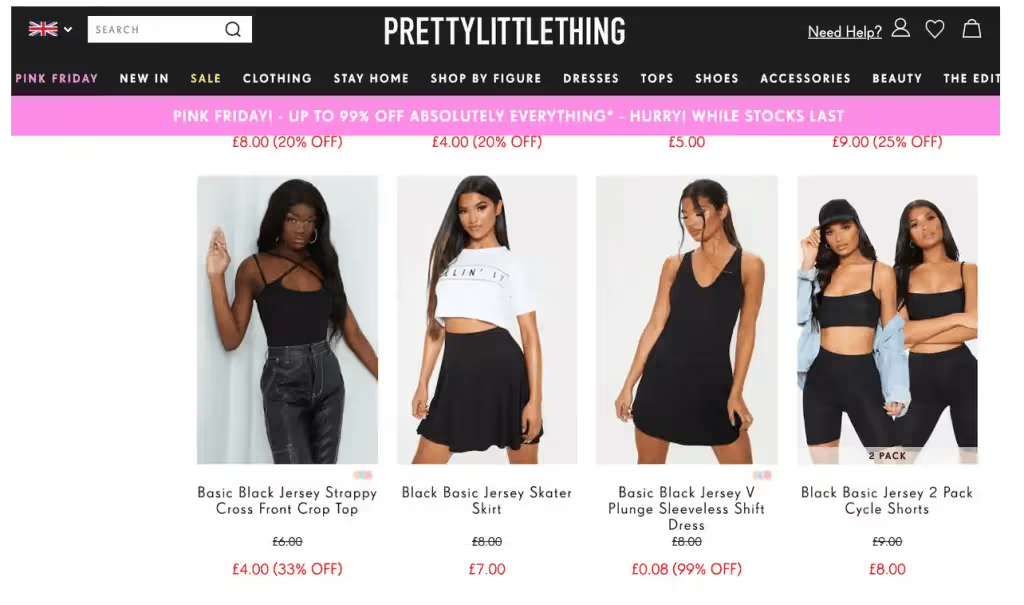Black Friday has gone from the most popular shopping event of the year to the most criticised. It may seem obvious, but the consumption-driven holiday is the opposite of sustainable.
Violent mobs of bargain-hunters aside, the online activities of the holiday are seen as the peak of unsustainable hyperconsumerism. Thinktank, Green Alliance, found that up to 80% of items bought over the weekend, as well as plastic packaging, will end up in landfill, incineration or low-quality recycling after a very short life.
Climate conscious consumers are no longer drawn to the simple “buy more for less” promises of massive sales; they want to see brands face up to their social and environmental responsibilities.
Shoppers’ Changing Priorities
An increase in conscious consumption and desire to spend with brands that share our values may be a result of the ‘caring culture’ fostered in the pandemic.
During the height of the COVID 19 outbreak, everything from wearing a mask to protect the vulnerable, to donating to food banks and staying at home was encouraged. Those who indulged in panic buying were criticised as selfish and excessive.
This rise in individual social responsibility may have sped up our interest and awareness of climate issues. As many as 82% of consumers now say that sustainability is more top of mind now than it was before the pandemic.
In total, 85% of adults in Britain are worried about global warming, with 55% of women describing themselves as “deeply concerned”. This anxiety does not match up with the hyper-consumption of the November discount period, suggesting retailers need to adapt their approach in order to continue to be successful.
A Case Study
This won’t be the first year that a typical Black Friday approach is likely to face backlash.
We need only look at the disgust consumers expressed at Pretty Little Thing’s ‘up to 99% off sale’. This saw the brand flogging clothing from as little as 4p, to the horror of environmentally and socially conscious consumers.
Many pointed out the impossibility of garment factory workers being paid a fair wage, as well as the grossly wasteful over-consumption such discounts promote.

This example perfectly demonstrates a change in consumer opinions, and as a result, behaviour. March 2021 research by Deloitte even revealed that one in three consumers stopped purchasing certain products, or from certain brands, because of sustainability concerns.
In response, brands have a choice. Panic and ignore, or take the opportunity to innovate and listen to consumers’ demands for environmentally conscious consumption patterns.
Excessive consumption is out, while considered purchases are in. But eco-friendly business practices are not just ‘trendy’, they’re becoming necessary for survival.
Consumers vote with their wallets. Will your brand rise to the challenge?
What This Means For Brands
78% of consumers believe big businesses have a role to play in helping to fight climate change. We want to make sustainable choices, but we need brands to make those choices a viable, accessible reality.
Brands should break the anxiety-inducing task of saving the earth down into small, digestible steps. It’s ultimately about making consumers feel truly good about their consumption choices. This will go a long way towards building brand loyalty.
Innovative solutions are welcome. Change is usually met with resistance by consumers, but here they’re actively demanding it.
Black Friday makes a great opportunity to implement changes to brand values and identity that would otherwise be deemed disruptive. Feel free to think outside the box.
Green Friday Strategy
Black Friday can be a great time to start making consumers aware of your values. Those who are critical of the hyper-excessive discounts that litter cyberspace aren’t absent from the market entirely. In fact, they’re seeking out an alternative, sustainable buying experience. This is your opportunity to make that you!

Black Friday is a great chance to make your brand stand out from the crowd for all the right reasons. Here’s how…
Charity Donation
One way to offset your brand’s environmental impact this Black Friday is through partnerships with an eco-friendly charity. This creates opportunities for customers to have a direct and active positive environmental impact while they purchase.
Donation schemes or ‘buy one and we’ll donate one’ systems are a good way to demonstrate your values to consumers while putting sustainable choices in their hands.
Remember to do your research to make sure the cause you choose aligns with your brand values and has no nasty secrets! If the partnership doesn’t feel like a natural fit, or consumers find out that the charity you choose has an unsavoury reputation, you could do more harm than good to your sustainable strategy.
Carbon Offsetting
Carbon offsetting means addressing the carbon footprint of a specific activity and taking positive steps to balance out the damage through eco-friendly initiatives like planting trees.
Other options include reclaiming and recycling plastic from the ocean, protecting forests, building wind farms, or purifying water sources.
Carbon offsetting can be offered at checkout, funded by an optional customer donation, or the cost can be handled by the brand and assured for every order.
Sustainable Shipping
We’ve seen shipping get speedier and speedier over the last few years, but is it getting more sustainable?
Local delivery options are an efficient way to reduce total delivery mileage, pollution, the time it takes to fulfil orders, and cost! This can even be offered for free as a reward to sustainably-minded customers, reminding them how much you value their eco-conscious choice to purchase from you. Sounds like a win all around.

While local delivery isn’t always an option, sustainable packaging is. There are so many options, from 100% recyclable cardboard and paper, to biodegradable or compostable plastic alternatives.
Eco-education
Some consumers aren’t aware of the environmental impacts of their purchasing habits, and those who do are usually open to learning more.
Inform your customers of the positive impact of purchasing from your brand, rather than another, less sustainable one.
Content options include a sustainability FAQ section on your website, links to external online learning resources, blog posts or video content dissecting environmental issues in your industry, and the steps you’re taking to address them.
You could make your social media platforms a community forum for sharing eco-friendly thoughts, concerns and advice. One option with the potential to generate a lot of buzz is a sustainability social media takeover, partnering with eco-conscious influencers to grow engagement and forge lasting consumer relationships.
Closing the Loop
Trade-in or repair schemes keep your products out of landfill for longer and reduce consumption of entirely new ones.
You could also offer your customers free recycling of products that are tired and damaged beyond repair, incentivised with a discount on their next purchase.
All these ideas help to combat our ‘throwaway culture’, in which we’d rather buy something entirely new than make do and mend. If we can keep goods in circulation for longer, we reduce strain on landfill sites, the pollution created by overproduction, and retail waste.
Be Sincerely Sustainable
Be transparent about your eco-progress and how far you have to go. Don’t mislead consumers in an effort to seem more sustainable in your practices than you are. With the dominance of social media ‘cancel culture’ this is bound to turn around a bite you in the backside…
Instead, make sure your sustainability is a genuine effort and a sincere part of your brand identity. Avoid accusations of greenwashing and risk alienating environmentally conscious consumers.
Be clear and concise; use easy to understand language and avoid jargon. Include simple-to-decipher stats, allowing customers to understand the impact they make by purchasing from you.
Making sustainability a part of the cohesive brand experience is essential. Don’t make it into a novelty. While Black Friday can be a great opportunity to launch a more sustainable brand identity, your efforts shouldn’t stop there.
Black Friday is a busy period for everyone in retail. Make your campaigns stand out from the crowd for all the right reasons this year, with a sustainable take.
Unsure how to manage your Black Friday marketing campaigns? Check out DMT’s services in PPC, Paid Social, Email advertising and more, and get in touch to find out more.
















.svg)